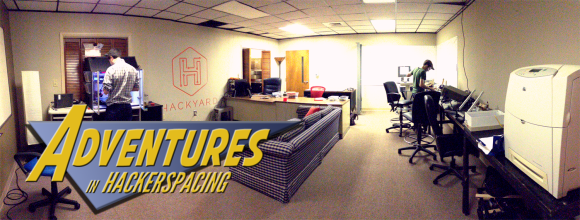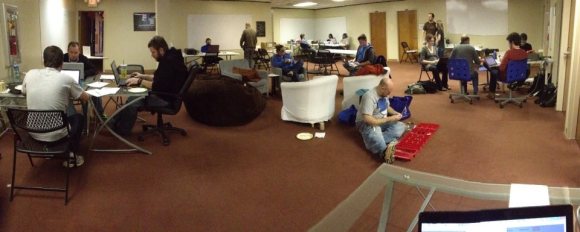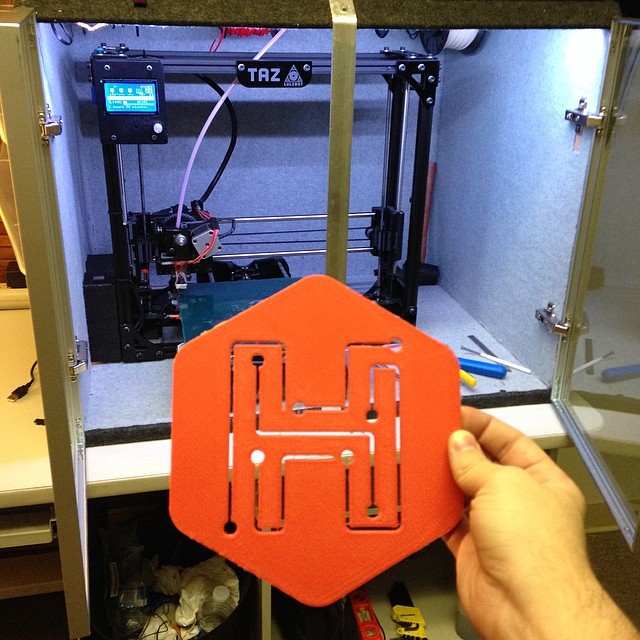
It’s funny how quickly it can all come together. If there’s a hackerspace or makerspace in your area, I hope you’ve gone by to see what it’s like. If there isn’t, you can always start your own…
That notion seems so simple, doesn’t it? Round up a few like-minded folks, find a space—any space—shove them and some equipment into it. Two years of attempted round-ups and shove-ins, however, is enough to discourage the most passionate of would-be hackerspacers. By all predictions, the effort to start a hackerspace in Athens, GA was a marathon, a gradual advance culminating in a hard-earned workspace. But that’s not what happened. Hackyard Athens erupted into being.
In only one week.
Don’t mistake that summary as an attempt at bragging: it’s not. I’m still baffled how we got here. It’s a declaration of befuddlement, though no one’s complaining. In this episode of Adventures in Hackerspacing, I’ll detail a space’s earliest beginning stages, up to the launch of the space itself.
 I started this column to document the formation of a hackerspace in my town, but never felt there was enough content to share. Who wants to hear about hours of bi-weekly meetings at a sports bar that, after a year, amounted to a few acquaintances and unfulfilled hopes and dreams? Instead, I turned to my friends at Freeside Atlanta for a two part behind-the-scenes conversation (Part I & Part II, if you missed them). If I had nothing to report about the Athens scene, at least I could get some guidance from a successful space and relay their experiences to Hackaday readers.
I started this column to document the formation of a hackerspace in my town, but never felt there was enough content to share. Who wants to hear about hours of bi-weekly meetings at a sports bar that, after a year, amounted to a few acquaintances and unfulfilled hopes and dreams? Instead, I turned to my friends at Freeside Atlanta for a two part behind-the-scenes conversation (Part I & Part II, if you missed them). If I had nothing to report about the Athens scene, at least I could get some guidance from a successful space and relay their experiences to Hackaday readers.
Meetups at the Bar
Meanwhile, I teamed up with an engineering friend and held casual meetings at a local bar. The plan involved rallying interest through a Meetup group and convening twice a month to discuss projects and problems. The result was largely a success, fielding around 10-15 people each time, though a few approached numbers around 25-30. These kind of events offer a low-pressure, friendly social environment: it’s easy to lure someone for a casual evening out. Freeside grew out of similar meetups at a bar in Atlanta (though you could hardly compare the Athens group to DEFCON404’s seemingly ceaseless dedication to regular, quality meetings).
Despite the relative ease of attracting like-minded individuals to your evening out, there are a few problems with meeting in bars and restaurants. The seating arrangements tend to restrict how many people you can chat with, and anyone sharing a project ends up surrounded by a small cluster while others behind them strain to listen. You’re also guaranteed at least three interruptions—orders placed, orders arrive, orders paid for—the severity of which varies depending on the establishment.
You also don’t own the space. Any show-and-tell items or projects must be carted in, and there’s little opportunity to work together unless you decide to hang out later. The natural progression, we thought, was to encourage our fellow attendees to come together and found a hackerspace. The idea was well-received. The result was a disaster.
Never try to start a hackerspace in a college town around Thanksgiving. We knew attendance would slide as the holiday approached, but we made a poor decision by introducing space options a few weeks prior. My friend and I had scouted potential locations, taken some pictures, and worked out a few numbers. When we presented our findings at the next meeting, the holiday spirit had eaten away at our group’s momentum. Attendance didn’t slide, it plummeted. Our hackerspace pitch reached an audience of 5 rather than 30, and some had reservations about paying a monthly fee to use a space. By the time Thanksgiving was over, the university was in the midst of final exams, followed immediately by winter break and the slew of holidays that accompany it.
A new year and two sparsely populated meetings later, it was dead.
Hackathons and New Communities

I didn’t want to give up, but I also didn’t want to lead another charge without first taking a break and reconsidering the approach. When a friend told me about another local group that was trying start a hackerspace, I was relieved. After reaching out to the folks in charge, I learned that this group was being helped along by FourAthens, a non-profit organization that supports the local tech community. Though the hackerspace group was just starting, they had—through their association with FourAthens—an established community from which to draw interest, and access to event space.
The plan was to hold a monthly hackathon event that would pull in a crowd and get people making. The format for the hackathon was relatively unrestricted: no topic limitations, and pre-planning was allowed, but the entire challenge took place over just four hours. In contrast to the bar/restaurant meetings, the hackathon was much more engaging and more fun, and still drew a crowd. At least 40 people came to the first one, although only 15-20 participated. This new approach looked good.
After a few months went by, however, the hackathon format revealed some underlying problems. Four hours isn’t much time. If you want to complete an impressive hack, you need to devote a decent chunk of your week to some pre-planning. When you show up, though, you’re “that guy.” The one who has barrels full of stuff, amassed from days preparing. You aren’t hacking, you’re assembling.
The alternative is what I call the “Boy Scout” approach: bring all your equipment and components, team up with a new friend, and come up with a project on the spot. You usually don’t finish.
The event was less of a community experience and more of a public demonstration.
The four-hour format also limited options for first-timers. It’s difficult for an outsider to jump into hardware hacking when the extent of his or her experience with electronics is charging a cell phone. Newcomers were too intimidated, and experienced hackers were too busy. The event was less of a community experience and more of a public demonstration. Like watching a belligerent renaissance faire glassblower who avoids eye contact and mutters obscenities while rushing around an impromptu workshop, eyed by a crowd wondering why the frantic man is bleeding. And, worse still, why doesn’t he care?
The subsequent hackathons turned into interview sessions. Relatively little was made anymore. Instead, we explained stuff to curious-yet-distanced visitors. As the evening pushed on and the 4-hour competition drew to a close, fewer and fewer hackers had anything to show for it. I like the hackathon format, but it wasn’t a good fit for a group struggling to exist. Interest and numbers waned. Similarly, the quest for a permanent space also stagnated. It felt like another dead end.
The Hackyard

When I said Hackyard Athens exploded into being, I was a bit hyperbolic. The community had been prodded from different directions for several months (or years, depending on who you were), and there was a foundation of interested parties.
A handful of us decided to try something different, and split off to establish the Hackyard. The plan? Bootstrap it. Scavenge enough money to rent something. Anything. Within a week, we had moved into a space and filled it with cool stuff. The Hackyard’s location—the same offices as the local tech incubator—guarantees plenty of foot traffic passing by and wondering what’s going on. Hackyard currently holds regular open house nights every Thursday, which gives these newcomers an opportunity to meet us in a low-stress (for both sides) environment.
If I’ve learned anything from this experience, it’s that overlapping skillsets aren’t very useful at the beginning. Those initial meetings were chock full of nerds, but no one had any clue how to handle a non-profit organization. The four of us who founded Hackyard Athens, however, were the perfect blend of software, hardware, graphics, web, and business experience. That, and we’re all good friends. Except [Tommy] with his stupid hat.
Look for the next episode as the space grows!




![[Jim's] deadly with a Nerf rifle. More Hackyard](https://i0.wp.com/hackaday.com/wp-content/uploads/2014/06/imag1524.jpg?w=223&h=126&ssl=1)














That’s what I did. I started my own hackerspace. It is called my garage. No 3D printer yet, or laser cutter, but what the hey?
Hi, I’m Rich, the president of Foothills Community Workshop. We are a hackerspace in Granite Falls, NC, a small town with a population of less than 5,000. We have been open for almost three years. I thought some of you might be interested in our story of a fast hackerspace opening.
I wanted to belong to a hackerspace, but the closest one was over an hour away. I found Dan on hackerspaces.org who also wanted a hackerspace, but didn’t have any luck starting one. Dan and I discussed it and thought if we had a physical space first it might be easier to attract members.
I went to the mayor of our town and asked if he knew of any cheap available space. He sent me to the town planner who was aware of a space that might suit us. We talked to the landlord and he really liked our idea of starting a hackerspace. We leased 3,600 square feet from him in an old mill building. He gave us an extremely good deal on the rent. Dan knew Michelle and I knew Colin. Between the four of us we could afford the rent even if we had no other members. This whole process took less than 30 days.
The space was completely empty, no lights, no power, no rooms. We started working on wiring the space for lights and power. Once we had a space to show we started finding new members.
Now we have about 35 members and 4,000 square feet of space, an electronics shop, classroom, machine shop, amateur radio station, wood shop, CNC machines, an HO model railroad, a laser cutter and much other stuff.
This is great, nice work on pulling it all together!
Did you found a non-profit in conjunction with this? How was that to navigate? Do you find it difficult to keep every seat on the board of directors full?
Congrats! I’ll try to make a road trip sometime and check it out. I still owe the guys at TheClubHou.se in Augusta a visit too. Hope to see yall at Atlanta Maker Faire in the fall.
–Randy / Freeside Atlanta
that is one tidy hackspace!
Hey, I’m from Athens (well, close anyway) and always thought it would be cool to have a Hackerspace but never thought it would take root. Glad to see I was wrong.
I just wanted to let everyone know that we have a hackerspace in Lawrenceville, GA called Geekspace Gwinett (http://www.geekspacegwinnett.org/) which is located about dead center between Atlanta and Athens. We currently have around 20 members and we are growing fast. We have regular open houses on Tuesday and Thursday nights from 6-10. Come check us out!
Hey Stephen!
I’ve heard great things about you guys and your space. I’ll have to swing by your open house when I’m back in town and say hello.
-J